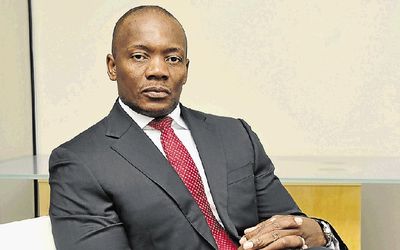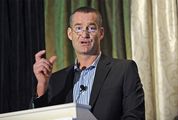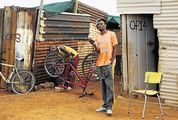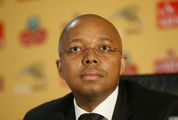SOME people buy a new car every three years," says DJ Kumbula, CEO and cofounder of InnoVent, an AA Empowerdex BEE level one-rated company, and Qrent. "Personally I prefer to wait and get a car with 60,000km on the clock and a 40,000km motor plan. I’m still driving a premium brand, just at half the price."
This is, broadly speaking, the business model that saw the creation of InnoVent in 2003. The company does what is considered the traditional rental of technology assets such as laptops, desktops and servers.
As with all depreciating assets, the moment you take them out of the box, they are worth less, which is why, says Kumbula, "it is pointless to put cash reserves into them. Renting them is really a financially smarter way to procure assets."
Rental periods at InnoVent, which has more than R2bn in assets under management, are on average three years. After that the customer returns the assets in "good nick" — having been maintained over that time by the supplier.
"About six years ago we started thinking about what we could and should do with these returned assets. They are Tier 1 products with excellent specs and they’ve been fully maintained. So Qrent was born," Kumbula says.
"We take these assets, just like a car, and refurbish them — that doesn’t mean opening them up and reassembling them, they’ve been maintained so it’s more cosmetic retouching than reconditioning."
A warehouse was built, technicians employed and when their first incarnation as an IT hardware asset is over, Qrent does a 21-point "spec and check" on all the machines and fixes whatever needs to be fixed. "We find 99% of the time there is no damage.
"But who would we target with this product, for which we now offer a warranty within our service level agreement?" Kumbula asks.
...
MOST people like the new laptop smell and changing minds is harder than changing hardware.
"We started with our short-term rentals," says Kumbula. "Lots of people run projects and conferencing when they need perhaps 1,000 laptops, all of the same specs, for a short period of time; sometimes for just a few days or so.
"So we started with that, with clients such as the Independent Electoral Commission and Statistics SA, supplying up to 2,000 machines at a time. This is a differentiator for us in this space; the number of machines we can supply and support."
InnoVent and Qrent use only these refurbished products. "Our staff don’t have brand new machines because they don’t need them," Kumbula says.
"We looked at the behaviour of companies. About 80% of the user base in a company does not need the latest and greatest. It’s like giving a R1m Ferrari to a 90-year-old — no disrespect — to drive to the local shop at 5km/h.
"Most office workers use about 10%-20% capacity of their machines, but the company is paying for 100%. So we went to market, not suggesting that anyone replace all their equipment, simply saying, segment your users.
"You might have thousands employed, of which 200 work in programming — they do need the latest and greatest. And executives often want the best, even though their machines might be the most idle.
"But what about the 80% of your staff doing admin? We’re asking that you think rationally about the function of your hardware rather than its form.
"Changing this mind-set is a challenge but I want to stress that people should not get emotional about hardware. What do you want out of it? What do your users do with it? That’s how we came to work with Discovery."
Qrent approached Discovery about four years ago with desktop computers, the Dell Gx 755s, that were three years old, explaining the rental model with its maintenance guaranteed and — most tellingly — the potential cost saving.
"We were unsure about the concept as we did not believe three-year-old desktops could be used effectively and reliably," says Discovery’s chief procurement officer, Gary Taylor. "But we decided to explore the idea and test the desktops in our demanding environment. Our IT hardware test team put them through the motions for four weeks.
"We were pleasantly surprised by the positive results; there was no distinct performance difference between the brand-new desktops we had been buying and the Qrent refurbished ones."
Qrent not only gives its machines a full warranty but, says Kumbula, offers a better after-sales service than if they had been bought new. "The normal turnaround time for repairs for new machines is ‘next business day’. I give my clients extra machines so they have spare units on site, ready to go should the need arise, on top of the maintenance offered over the term of the rental," he says.
Taylor says Discovery’s consumption of IT hardware is significant. Standardisation and security of supply are key to the financial services giant.
"We could not afford to change our strategy and opt for the Qrent offering if we could not get standardised equipment in large quantities. Qrent assured us they could do this — and they have." The most obvious appeal, certainly for Discovery, is the cost saving.
"Qrent priced their desktops at about 50% of the price of a new one. Furthermore, Qrent didn’t want any purchase price upfront but offered a payment plan over 36 months, which made a huge difference to our cash-flow position," says Taylor.
Four years later, Discovery has about 4,000 Qrent desktops — which Kumbula says have a projected life span of 10 years (a laptop he puts at six). "If Discovery had purchased these they would have spent about R28m; using Qrent they’re sitting at about R14m, that’s just on a single line item. A 50% saving over four years," says Kumbula.
By the end of the year the number of machines Discovery will be renting is expected to be 5,000.
"Qrent has been a pleasant surprise for us," says Taylor. "We are extremely satisfied with the product and the benefits have been tangible as well as material."
...
KUMBULA is a CA who trained with PwC and worked there for five years, followed by two years at the Council for Scientific and Industrial Research and three years at a leasing company, where he met his business partner, Zakhe Khuzwayo.
Sasfin Bank supplied the seed funding for Qrent, and remains a small shareholder.
"Sasfin is a very entrepreneurial bank," says Kumbula. "And they’re very small so you get to meet with the founder and CEO directly. They bought into what we were doing very early on."
InnoVent employs 30 people in SA. Qrent employs a further 30 here as well as 20 in Zimbabwe, 15 in Zambia and 10 in Tanzania.
"We started moving into Africa with the Zimbabwe office about three years ago," says Kumbula.
The longer-term goal includes "every financial director and chief information officer not signing off on anything until they have seen the Qrent alternative", growing geographically organically and expanding their asset types.
They plan to add yellow metals, medical equipment and vehicles to their portfolio to diversify both in terms of risk and return.
For many — and Kumbula confirms this forms a part of the business model rather than being a serendipitous byproduct — an attraction is the embedded recycling aspect of Qrent’s offering.
It proposes the opposite of what was so punted in the West after the Second World War: replace, it’s cheaper and easier than repairing.
Not anymore it isn’t, and with so many electrical and IT components ending up in the world’s landfills, reusing a product — effectively, efficiently and extensively — for its original purpose must be the best type of "repurposing" possible.
So instead of the usual knee-jerk reaction to the horror that is "second-hand", think of it as smart recycling instead.

InnoVent and Qrent CEO DJ Kumbula says it’s important to make an unemotional decision about employees’ computing needs. He advocates a segmented approach. Picture: FREDDY MAVUNDA
SOME people buy a new car every three years," says DJ Kumbula, CEO and cofounder of InnoVent, an AA Empowerdex BEE level one-rated company, and Qrent. "Personally I prefer to wait and get a car with 60,000km on the clock and a 40,000km motor plan. I’m still driving a premium brand, just at half the price."
This is, broadly speaking, the business model that saw the creation of InnoVent in 2003. The company does what is considered the traditional rental of technology assets such as laptops, desktops and servers.
As with all depreciating assets, the moment you take them out of the box, they are worth less, which is why, says Kumbula, "it is pointless to put cash reserves into them. Renting them is really a financially smarter way to procure assets."
Rental periods at InnoVent, which has more than R2bn in assets under management, are on average three years. After that the customer returns the assets in "good nick" — having been maintained over that time by the supplier.
"About six years ago we started thinking about what we could and should do with these returned assets. They are Tier 1 products with excellent specs and they’ve been fully maintained. So Qrent was born," Kumbula says.
"We take these assets, just like a car, and refurbish them — that doesn’t mean opening them up and reassembling them, they’ve been maintained so it’s more cosmetic retouching than reconditioning."
A warehouse was built, technicians employed and when their first incarnation as an IT hardware asset is over, Qrent does a 21-point "spec and check" on all the machines and fixes whatever needs to be fixed. "We find 99% of the time there is no damage.
"But who would we target with this product, for which we now offer a warranty within our service level agreement?" Kumbula asks.
...
MOST people like the new laptop smell and changing minds is harder than changing hardware.
"We started with our short-term rentals," says Kumbula. "Lots of people run projects and conferencing when they need perhaps 1,000 laptops, all of the same specs, for a short period of time; sometimes for just a few days or so.
"So we started with that, with clients such as the Independent Electoral Commission and Statistics SA, supplying up to 2,000 machines at a time. This is a differentiator for us in this space; the number of machines we can supply and support."
InnoVent and Qrent use only these refurbished products. "Our staff don’t have brand new machines because they don’t need them," Kumbula says.
"We looked at the behaviour of companies. About 80% of the user base in a company does not need the latest and greatest. It’s like giving a R1m Ferrari to a 90-year-old — no disrespect — to drive to the local shop at 5km/h.
"Most office workers use about 10%-20% capacity of their machines, but the company is paying for 100%. So we went to market, not suggesting that anyone replace all their equipment, simply saying, segment your users.
"You might have thousands employed, of which 200 work in programming — they do need the latest and greatest. And executives often want the best, even though their machines might be the most idle.
"But what about the 80% of your staff doing admin? We’re asking that you think rationally about the function of your hardware rather than its form.
"Changing this mind-set is a challenge but I want to stress that people should not get emotional about hardware. What do you want out of it? What do your users do with it? That’s how we came to work with Discovery."
Qrent approached Discovery about four years ago with desktop computers, the Dell Gx 755s, that were three years old, explaining the rental model with its maintenance guaranteed and — most tellingly — the potential cost saving.
"We were unsure about the concept as we did not believe three-year-old desktops could be used effectively and reliably," says Discovery’s chief procurement officer, Gary Taylor. "But we decided to explore the idea and test the desktops in our demanding environment. Our IT hardware test team put them through the motions for four weeks.
"We were pleasantly surprised by the positive results; there was no distinct performance difference between the brand-new desktops we had been buying and the Qrent refurbished ones."
Qrent not only gives its machines a full warranty but, says Kumbula, offers a better after-sales service than if they had been bought new. "The normal turnaround time for repairs for new machines is ‘next business day’. I give my clients extra machines so they have spare units on site, ready to go should the need arise, on top of the maintenance offered over the term of the rental," he says.
Taylor says Discovery’s consumption of IT hardware is significant. Standardisation and security of supply are key to the financial services giant.
"We could not afford to change our strategy and opt for the Qrent offering if we could not get standardised equipment in large quantities. Qrent assured us they could do this — and they have." The most obvious appeal, certainly for Discovery, is the cost saving.
"Qrent priced their desktops at about 50% of the price of a new one. Furthermore, Qrent didn’t want any purchase price upfront but offered a payment plan over 36 months, which made a huge difference to our cash-flow position," says Taylor.
Four years later, Discovery has about 4,000 Qrent desktops — which Kumbula says have a projected life span of 10 years (a laptop he puts at six). "If Discovery had purchased these they would have spent about R28m; using Qrent they’re sitting at about R14m, that’s just on a single line item. A 50% saving over four years," says Kumbula.
By the end of the year the number of machines Discovery will be renting is expected to be 5,000.
"Qrent has been a pleasant surprise for us," says Taylor. "We are extremely satisfied with the product and the benefits have been tangible as well as material."
...
KUMBULA is a CA who trained with PwC and worked there for five years, followed by two years at the Council for Scientific and Industrial Research and three years at a leasing company, where he met his business partner, Zakhe Khuzwayo.
Sasfin Bank supplied the seed funding for Qrent, and remains a small shareholder.
"Sasfin is a very entrepreneurial bank," says Kumbula. "And they’re very small so you get to meet with the founder and CEO directly. They bought into what we were doing very early on."
InnoVent employs 30 people in SA. Qrent employs a further 30 here as well as 20 in Zimbabwe, 15 in Zambia and 10 in Tanzania.
"We started moving into Africa with the Zimbabwe office about three years ago," says Kumbula.
The longer-term goal includes "every financial director and chief information officer not signing off on anything until they have seen the Qrent alternative", growing geographically organically and expanding their asset types.
They plan to add yellow metals, medical equipment and vehicles to their portfolio to diversify both in terms of risk and return.
For many — and Kumbula confirms this forms a part of the business model rather than being a serendipitous byproduct — an attraction is the embedded recycling aspect of Qrent’s offering.
It proposes the opposite of what was so punted in the West after the Second World War: replace, it’s cheaper and easier than repairing.
Not anymore it isn’t, and with so many electrical and IT components ending up in the world’s landfills, reusing a product — effectively, efficiently and extensively — for its original purpose must be the best type of "repurposing" possible.
So instead of the usual knee-jerk reaction to the horror that is "second-hand", think of it as smart recycling instead.




















Change: 1.41%
Change: 1.74%
Change: 1.55%
Change: 1.65%
Change: 1.42%
Data supplied by Profile Data
Change: 0.57%
Change: 0.32%
Change: 1.41%
Change: 0.00%
Change: 0.08%
Data supplied by Profile Data
Change: 2.01%
Change: 1.49%
Change: 1.65%
Change: 2.10%
Change: 1.40%
Data supplied by Profile Data
Change: -1.30%
Change: -0.62%
Change: -0.90%
Change: -0.52%
Change: -2.08%
Data supplied by Profile Data